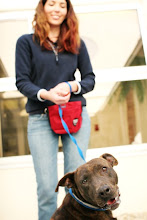Strains are sometimes put on the relationship when human expectations differ from reality. One must remember that any dog has the potential to become an ideal companion under the right circumstances. You must ask yourself what those circumstances might be, and then begin to implement them.
It is important to remember to build your bond with your new dog and always LOVE the dog you HAVE not the one one you wish you did! Once your pet enters your home it becomes your responsibility to deal with their behavior, whatever it may be. If the dog is yours, so then is the responsibility.
When looking for a new furry family member, ask yourself these simple questions: What do you want out of your relationship with your dog? What do you see you and your dog doing together? And are you ready for the responsibility?
Dogs, like us, are a combination of nature and nurture. Every dog has a behavior potential that can be shaped by consistent and positive training. Dogs are incredibly resilient; they can begin to adjust to a new life TODAY, no matter what their past might have held. Adjustment periods can be tough, but the end result is always worth the effort!
If your dog just isn't meeting your expectations.....adjust them! Make it a point to seriously tackle each problem. Begin obedience classes and have the whole family participate. Learn to shape what is desired rather than punish what is not. Obedience training has a settling effect on a dog and gives you an opportunity to bond and re-direct focus. Take time to touch your new dog all over. (Feet, ears, teeth, tail, paws...) This will make trips to the groomer and veterinarian easier for everyone! Also do this while your new dog eats to help prevent any food aggression issues.
If you are bringing your new friend into a household with a resident dog, make sure to introduce the two on neutral ground. Go for a walk! Do NOT walk he dogs right up to one another nose to nose, a side by side walk will encourage companionship and tire them out! When the get back home they will be too pooped to start any trouble.
Remember to dog-proof your home. (Especially important with puppies!) Walk around your house and yard and move anything you do not want the dog to get a hold of. If you do not want your new dog in certain rooms of the house, purchase baby gates to block their way. Remember it is YOUR responsibility to keep your dog away from things you do not want destroyed or that might be harmful to them.
If you will be crate training your dog, make sure to purchase a crate that is just large enough for the dog to stand up and turn around in; no more, no less. If you are buying a crate for your puppy to grow into, you can block off part of it with cement blocks. Stainless steel water and food bowls are recommended as they can not be torn up and ingested. Also, be sure to look for durable bedding; hard to chew up and easy to clean will make your life much easier!
You will want to purchase a simple 4-6 foot nylon leash with collar. No flexi-leads, harnesses or pinch collars will be necessary with proper training. You'll want some toys as well. Get a nice variety and then rotate them every month so your dog doesn't get bored. KONG toys are wonderful for dogs who chew and can be stuffed with anything from peanut butter and cream cheese to wet food and bananas! (You can freeze them to keep your pooch busy for a longer period of time!) Now your job will be to teach your dog what is appropriate to chew on vs. what isn't. (ex: the TV remote, your shoes and your sofa!)
Select a high quality food with little or no preservatives. If you can't pronounce most if not all of the ingredients, don't buy it! If your new dog has been eating a different food than the one you plan on feeding them, remember to gradually mix the new food in with the old, then wean them off the old and onto the new. A drastic change in diet can really upset a dogs stomach. Don't allow your new dog to become a picky eater! Feed them their food at set times. When they are hungry, they'll eat! Do not leave food down for longer that 20 minutes; after that pick it up. Also, refrain from 'free feeding' your dog. It can lead to obesity and makes it difficult for you to monitor their eating habits.
Make an appointment for your new dog at your veterinarian about two weeks after they've joined your household.
Make sure the entire family understands the 'doggy' rules and that there is a clear consensus of what behaviors are to be reinforced and which ones will not.
If all of this sounds like a lot of work, it's because it is! But life with out dogs is not much of a life at all......(in my opinion anyway!)






No comments:
Post a Comment